Life Sciences News
See our Latest Journal Publications
New BBC drama shaped by Warwick expertise
The rise of antibiotic resistance is at the heart of a brand-new BBC drama, written by renowned author Val McDermid – and shaped by scientific expertise from the University of Warwick.
Airing on BBC Radio 4 in March, Resistance is a three-part story about an epidemic of a drug-resistant disease – and was informed by Professor Chris Dowson from the School of Life Sciences, the scientific advisor for the programme.
Read Press Release
Foot-and-mouth crises to be averted with vaccination strategy
 Research by Dr Mike Tildesley and colleagues shows foot-and-mouth epidemics could be controlled quickly and effectively by rapidly establishing how many animals can be vaccinated per day of an outbreak.
Research by Dr Mike Tildesley and colleagues shows foot-and-mouth epidemics could be controlled quickly and effectively by rapidly establishing how many animals can be vaccinated per day of an outbreak.
Read Press Release
Ash dieback: Insect threat to fungus-resistant trees
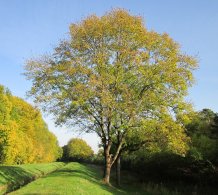 Ash trees which can resist the killer dieback fungus may be more vulnerable to attacks by insects, according to new research.
Ash trees which can resist the killer dieback fungus may be more vulnerable to attacks by insects, according to new research.
Scientists from the universities of Exeter and Warwick examined trees which are resistant to ash dieback and – unexpectedly – found they had very low levels of chemicals which defend against insects.
With efforts under way to protect ash trees from dieback, the scientists warn that selecting trees for fungal resistance could put them at risk from insects.
Deadly sleeping sickness set to be eliminated in six years
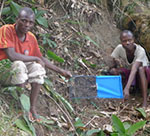 Gambian sleeping sickness – a deadly parasitic disease spread by tsetse flies - could be eliminated in six years in key regions in the Democratic Republic of Congo (DRC), according to new research by the University of Warwick.
Gambian sleeping sickness – a deadly parasitic disease spread by tsetse flies - could be eliminated in six years in key regions in the Democratic Republic of Congo (DRC), according to new research by the University of Warwick.
Kat Rock and Matt Keeling at the School of Life Sciences, with colleagues in DRC and the Liverpool School of Tropical Medicine, have calculated the impact of different intervention strategies on the population dynamics of tsetse flies and humans - establishing which strategies show the most promise to control and eliminate the disease.
Christmas dinner saved! Sprouts gain natural disease defence
 Professor John Walsh’s group at the School of Life Sciences, Wellesbourne campus, has discovered natural plant genes that will make sprouts resistant to two of the biggest threats they face: Turnip mosaic virus and Turnip yellows virus.
Professor John Walsh’s group at the School of Life Sciences, Wellesbourne campus, has discovered natural plant genes that will make sprouts resistant to two of the biggest threats they face: Turnip mosaic virus and Turnip yellows virus.
Warwick and Waitrose tackle global food security together
Food security is at the heart of a new doctoral training collaboration between the University of Warwick and Waitrose, thanks to an award from the Biotechnology and Biological Sciences Research Council (BBSRC).
Warwick will work with Waitrose and their suppliers, to provide PhD students with a unique combination of academic development and industry training in the field of agriculture and sustainable crop production.
New study identifies scope for more innovation in horticulture
A unique study has taken a thoughtful approach to understand why parts of the horticulture industry do not take up some of the innovative ideas that emerge from universities and research institutes, as well as other areas of the industry. The study has been undertaken by PhD student Jonathan Menary from Warwick Crop Centre, part of the School of Life Sciences.
Behind-the-scenes access at Warwick’s life sciences labs
 Scientific laboratories at the University of Warwick are once again being opened up to members of the public – giving YOU behind-the-scenes access to cutting-edge research happening in Coventry.
Scientific laboratories at the University of Warwick are once again being opened up to members of the public – giving YOU behind-the-scenes access to cutting-edge research happening in Coventry.
Over the next year, the School of Life Sciences is running a series of open events, allowing the local community to come along and find out how the natural world works – from our superbrains to superbugs!
The next event, ‘Getting to grips with antibiotic resistance’, will explore the international threat of antimicrobial drug-resistant bacteria – which are predicted to kill more people than cancer by 2050.
Warwick Crop Centre Joins Historic Tractor Parade
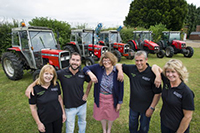 Staff and students from Warwick Crop Centre took part in the ‘70 tractors for 70 years’ Massey Ferguson procession organised by Coventry Transport Museum on Saturday 30 July.
Staff and students from Warwick Crop Centre took part in the ‘70 tractors for 70 years’ Massey Ferguson procession organised by Coventry Transport Museum on Saturday 30 July.
How viruses might influence estimates of global warming
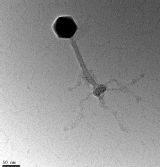 The tiniest life forms on Earth have a big impact on the way carbon dioxide is cycled between the atmosphere and the ocean, new research from the University of Warwick has found.
The tiniest life forms on Earth have a big impact on the way carbon dioxide is cycled between the atmosphere and the ocean, new research from the University of Warwick has found.
These life forms are viruses of some of the most abundant organisms on our planet: marine cyanobacteria.
The new research, Viruses Inhibit CO2 Fixation in the Most Abundant Phototrophs on Earth and published by Current Biology, demonstrates that the viruses of these cyanobacteria, cyanophages, use these genes to maintain the so-called “light-reactions” of photosynthesis, while shutting down the “dark-reactions”.
Cyanobacteria have had an incredible impact on the Earth by seeding the atmosphere with oxygen about 3 billion years ago, allowing for the existence of life as we know it. Today, this same process that acts to produce oxygen sucks up CO2 from the atmosphere.
Professor David Scanlan of the University of Warwick’s School of Life Sciences, the lead author of the research, said: “CO2 is a key greenhouse gas directly implicated in global warming. Given CO2 is converted into organic compounds during photosynthesis, factors that directly affect this process play a key role in modulating atmospheric CO2 levels.”
“We have known about these viruses for several decades” said Scanlan. “Things changed in 2003 when we discovered that these viruses have stolen genes from cyanobacteria that participate in photosynthesis. Now we have shown that these viruses modify photosynthesis during the demise of their host”.
On a global scale this results in losses of 0.02-5.39 Pg C yr-1 to viral induced inhibition of CO2 fixation. Per annum this upper figure is approximately 10% of the total CO2 fixed in the marine environment.
This data has important implications for measuring greenhouse gasses. Professor Scanlan explains:
“Quantification of net primary productivity is usually determined by directly measuring cyanobacterial photosynthesis and these methods rely on the coupling of light reactions to CO2 fixation”.
“In virus infected cells, this assumption of light reactions linked to CO2 fixation is incorrect and can therefore lead to a significant over estimation of CO2 fixation. This has very important implications for our understanding, and the estimates of, global warming.”
Contacts:
Professor Dave Scanlan
Email:
Tel: + 44 24 76 528363
Dr Andrew Millard
Email: Andrew.Millard@warwick.ac.uk
Tel: + 44 24 76 523589
Plants remember stress to help protect themselves
A new generation of plants better adapted to mitigate the effects of environmental change could be created following a fundamental step towards understanding how plants are able to retain a memory of stress exposure.
The research, led by Dr Jose Gutierrez-Marcos and published in the journal eLife, provides the first compelling evidence that plants have evolved ways to remember previous exposures to stress, in this case high salinity conditions, which can help subsequent progenies withstand the same stress in future.
Warwick students to present at MIT in international synthetic biology competition
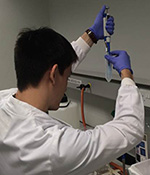 Undergraduate and newly graduated students from Warwick University will be travelling to MIT, Boston, this September 24-28 to compete in a global synthetic biology competition.
Undergraduate and newly graduated students from Warwick University will be travelling to MIT, Boston, this September 24-28 to compete in a global synthetic biology competition.
The team is interdisciplinary, with students from distinct academic fields bringing different skills and expertise to the table. These departments involve Maths, Physics, Engineering and Life Sciences, with Biomedical, Biochemical and Biological Sciences represented.
The team will be supported with advice from academic and research staff, including Prof Alfonso Jaramillo and Prof John McCarthy, among others, at the School of Life Sciences.
Warwick welcomes the next generation of scientists
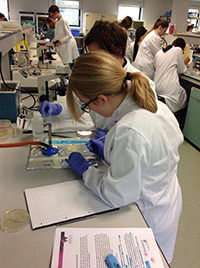 This week the School of Life Sciences welcomes the next generation of scientists from across the United Kingdom as part of a Headstart Summer School.
This week the School of Life Sciences welcomes the next generation of scientists from across the United Kingdom as part of a Headstart Summer School.
Taking place between the 19-23 July at the University’s Gibbet Hill campus, the Headstart Life Sciences course will provided the 17 year olds the opportunity to explore different biological disciplines taught within the School of Life Sciences and introduce them to a flavour of the academic side of undergraduate life.
Researchers have been awarded over £1.3m to research food security
Researchers from the University of Warwick’s School of Life Sciences (SLS) have been awarded over £1.36m in grants to further their work into food security.
The BBSRC Horticulture and Potato Initiative (HAPI) grants include substantial cash and in-kind contributions from industrial partners and will be used to support work into how to improve pest and disease control and post-harvest quality.
Commenting on the grants Professor Laura Green, Head of SLS, said:
“The BBSRC HAPI grants will help ensure that the University of Warwick’s School Life Sciences continues to play a leading role in improving food production globally. The Warwick HAPI-funded projects will result in substantial impacts on the horticulture industry by translating research findings into solutions that benefit several stages in the food supply chain, including farmers, processors and retailers.”
Researchers secure £3.19m boost to tackle superbugs
Life Sciences researchers have been awarded £3.19m in funding to support a flagship project into antimicrobial resistance (AMR).
The funding will enable multi-partner collaborations in order to tackle the growing threat of superbugs as part of a co-ordinated multi-disciplinary effort to fight their prevalence.
Awarded by a cross research council ‘war cabinet’ on AMR comprising the Medical Research Council (MRC) and the Biological Sciences Research Council (BBSRC), the funding marks one of the largest UK public grant investments in AMR research.
Researchers Prof Chris Dowson, Dr David Roper, Dr Adrian Lloyd from the School of Life Sciences and Prof Matthew Turner of the Department of Physics, will investigate a vital link in the chain of antimicrobial resistance – the bacterial cell wall. The main component of the wall is called peptidoglycan, which is the key target of penicillin and other similar antibiotics.
BBSRC award £601,861 to study Footrot in sheep
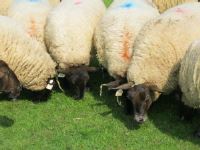
Professor Laura Green and Dr Kevin Purdy from the School of Life Sciences and Professor Matthew Keeling from the School of Life Sciences and the Mathematics Institute, at the University of Warwick have been awarded £601,861 to study the issue of Footrot in sheep.
The Biotechnology and Biological Sciences Research Council's (BBSRC) Animal Health Research Club (ARC) announced the award on Friday 27th March 2015 as part of a range of new research projects to improve the health of livestock.
Professor Laura Green, Head of the School of Life Sciences at the University of Warwick said:
“Footrot is very common in sheep in the UK, affecting more than 95% of sheep flocks. Footrot is caused by Dichelobacter nodosus, a bacterium that causes inflammation of the skin of the foot which leads to lameness. Using swab samples collected from the feet of sheep kept under different managements, the study will determine which molecular factors in Dichelobacter nodosus and which managements in sheep are most important in disease progression and how these lead to disease spread and persistence, informing on potential approaches to improve flock resilience to the disease."
Dr Celia Caulcott, BBSRC Executive Director, Innovation and Skills, said:
"By targeting these livestock diseases the Animal Health Research Club projects have the potential to protect farmed animals and food supplies and save UK farmers and the wider economy millions of pounds a year.”
“The Club shows that the public sector and private industry can work together to fund and support excellent research tackling important research challenges.”
Press release
New £12 million Synthetic Biology Centre to help drive advances in biotechnology, medicine and food security
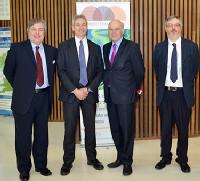 Researchers at the Warwick Integrative Synthetic Biology Centre (WISB), University of Warwick, that brings together disciplines including Life Sciences, Engineering, Chemistry, Computer Science, Education, and Law, have won a £12 Million award to create a new Centre to develop advanced technologies in synthetic biology.
Researchers at the Warwick Integrative Synthetic Biology Centre (WISB), University of Warwick, that brings together disciplines including Life Sciences, Engineering, Chemistry, Computer Science, Education, and Law, have won a £12 Million award to create a new Centre to develop advanced technologies in synthetic biology.
Vince Cable, the Secretary of State for Business, Innovation and Skills announced the new Centre as part of a £40M investment in UK synthetic biology, at the Manchester Institute for Biotechnology on Thursday 29th January.
Professor John McCarthy, Director of WISB and from the School of Life Sciences (pictured above with Vince Cable), said:
" We are delighted to receive this strategically important UK Synthetic Biology Centre Award. Synthetic biology has huge potential to generate valuable processes and products for biotechnology and medicine, as well as new understanding of the fundamental principles that underpin living systems. WISB is building a globally recognized presence as a centre of excellence in research and training in Synthetic Biology, and this grant from BBSRC and EPSRC will help us enormously in achieving our goals.”
Prof. David Evans - Possible that a successful GSK Ebola vaccine might help in this outbreak due to underestimating the number of cases
Following the announcement of GlaxoSmithKline (GSK) that a, currently under development, Ebola vaccine may not be ready for the current outbreak, Professor David Evans of the University of Warwick's Department of Life Sciences argues that it is "still possible that a successful GSK Ebola vaccine might help in this outbreak" due to the World Health Organisation (WHO) prediction that - by Christmas - new cases could number 10,000 per week.
Focus on naturally occurring protein to tackle dementia
Researchers led by Dr Sonia Correa have provided the first evidence that the lack of a naturally occurring protein is linked to early signs of dementia.
Published in Nature Communications, the research found that the absence of the protein MK2/3 promotes structural and physiological changes to cells in the nervous system. These changes were shown to have a significant correlation with early signs of dementia, including restricted learning and memory formation capabilities.
First national model for Bovine TB calls for more focus on cattle
In a study published in Nature this week, Professor Matt Keeling and fellow researchers have produced the first national model to investigate the bovine TB spread.
The results derived from the model in the Nature paper, entitled “A dynamic model of bovine tuberculosis spread and control in Great Britain”, demonstrated that the majority of herd outbreaks are caused by multiple transmissions routes - including failed cattle infection tests, cattle movement and reinfection from environmental reservoirs (infected pastures and wildlife). The study suggests that improved testing, vaccination of cattle and culling all cattle on infected farms would be the most effective strategies for controlling the disease.

